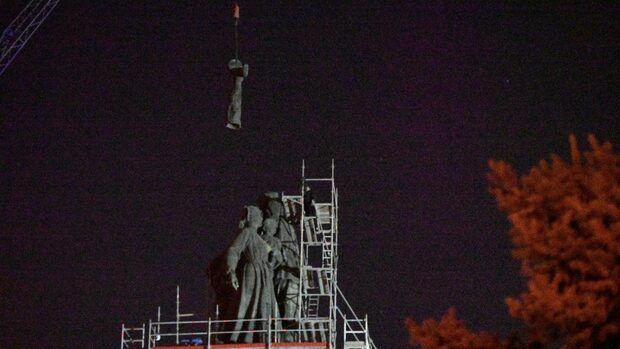
Symbol of Russian Occupation Taken Down in Sofia
Publication: Eurasia Daily Monitor Volume: 20 Issue: 190
By:

Thirty years after the Sofia municipality first decided to remove a monument to the Soviet army from the capital city, Bulgaria is finally dismantling the most prominent symbol of Soviet occupation on its territory. Built in 1954 by the communist authorities, the monument depicted a Soviet soldier with a raised machine gun, flanked by a local worker and a peasant woman. The sculpture stood higher than any other statue of a national hero in Bulgaria’s 1,300-year history. This is no longer the case, when the soldier’s arm holding the machine gun was severed when work on dismantling the statue began on December 12 (Dnevnik.bg; EuroNewsBulgaria.com, December 12). The Bulgarian government’s decision to demolish the monument reflects Sofia’s desire to further distance the country from Russia.
The effort to take down the statue caused a spike in political tensions. Pro-Russian political parties, such as the Bulgarian Socialist Party and the Russophile coalition “Revival,” staged protests against the demolition and briefly blocked Sofia’s streets. Surprisingly, their lines were quite thin, and attempts to initiate clashes with supporters of the removal were largely unsuccessful. Commentators remarked that pro-Russian politicians and public figures appeared more focused on receiving news coverage of their demonstration and provocations toward the police than on preventing the monument’s disassembly (Mediapool.bg, December 12).
Moscow reacted with ominous threats and accusations of growing “Naziism” in Bulgaria. Russian Foreign Ministry spokeswoman Maria Zakharova openly threatened Sofia with retribution for removing the monument: “The barbaric actions undertaken by the Bulgarian side are beyond any justification or forgiveness.” She added, “Bulgaria is once again choosing the wrong side of history, as it has done many times before. It will have to pay in full for the consequences of this disgraceful decision” (Mid.ru, December 12). Zakharova did not elaborate on what measures Russia would take against Bulgaria.
Previous attempts to remove the monument were obstructed by legal hurdles, bureaucracy, fear of Moscow due to Bulgaria’s total dependence on Russian energy, and, most importantly, a lack of political will in the Bulgarian government. The leader of the GERB (Citizens for European Development of Bulgaria) party, Boyko Borisov, was one of the staunchest defenders of the monument during his three mandates as prime minister and, before that, as mayor of Sofia. In 2007, the Russian ambassador to Bulgaria, Anatoly Potapov, awarded Borisov the Order of Mikhail Lomonosov and expressed gratitude for the Bulgarian leader’s promise that, as long as he manages the capital, the monument to the Soviet army would not be demolished (DarikNews.bg, November 23, 2007). As the removal is now underway, Borisov expressed an ambiguous position, stating that such monuments should remain as a reminder of the communist past. He also launched a political attack on the newly elected mayor of Sofia (Dnevnik.bg, December 12).
The current pro-European and pro-transatlantic government in Sofia has acted more decisively in removing the notorious symbol of the Soviet takeover of Bulgaria after World War II. The cabinet appointed in June is led by the We Continue the Change-Democratic Bulgaria coalition in a power-sharing agreement with GERB and the United Democratic Forces. In August, the Council of Ministers partially changed the monument’s legal ownership. It allowed for the transfer of operations to the regional governor of Sofia, Vyara Todeva, appointed by the cabinet in July (ClubZ.bg, August 2). The move starkly contrasted with a previous proposal from former Sofia regional governor Nikolay Pehlivanov, who wanted to grant Russia the indefinite use of and free right to the monument in exchange for maintenance and repair costs (ClubZ.bg, October 6, 2021).
Officially, the monument will be dismantled for restoration and subsequently moved to the Museum of Socialist Art near Sofia or exhibited elsewhere. Some local socialists and Russophiles, however, do not believe the sculpture will ever be seen again (24chasa.bg, December 12). According to expert analysis, the monument has not been properly maintained over the past 70 years. As a result, cracks have appeared in the bronze castings and connecting parts that could cause elements of the statue to separate and endanger the public (Sfoblast.egov.bg, December 7). In addition, when the monument was put in place in the 1950s, a substantial amount of concrete was poured into the sculpture’s shells to make them heavy enough to stand firm on the pedestal. The expansion and contraction of the concrete filling due to meteorological conditions has caused additional damage to the metal figures and may eventually destroy them (Faktor.bg, December 12).
The monument’s relief on the front side of the monument became a creative ground for expressing political opinions over the past 20 years. The renditions of Soviet soldiers have periodically been painted over—for example, as American comic characters to express pro-American sentiments, colored in pink to commemorate the Prague Spring, donned with pink hats in solidarity with Russian punk group Pussy Riot, and painted in blue and yellow many times since 2014 in support of Ukraine (Sofia Globe, February 24, 2014).
Those political stands played a key role in the final demolition of the Soviet army monument in Sofia. Russia’s aggression against Ukraine, especially since the full-scale invasion in February 2022, has raised anti-Kremlin sentiments throughout Bulgarian society. The main factor, however, is the current government’s determination to limit Russian influence in Bulgaria, fully eliminate energy dependence on Russia, provide military assistance to Ukraine, and investigate instances of suspected Russian sabotage at ammunition production facilities (Politico.eu, July 5).
Bulgaria no longer imports Russian natural gas, plans to revoke the EU-granted derogation on Russian oil early, and is working to switch to non-Russian nuclear fuel for its nuclear power plant. These measures remove an enormous obstacle to Sofia’s independent foreign policy. The next step will be finding an effective way to counter Russian propaganda and potentially investigate pro-Russian political parties for ties with Moscow and Russian financiers, as well as actions against Bulgarian security.



